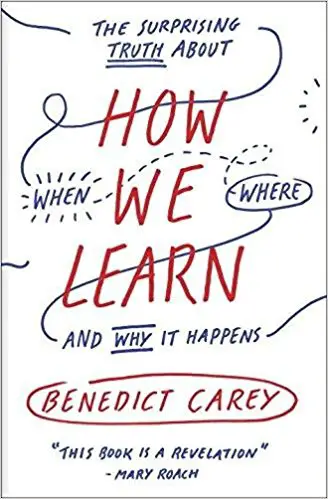We hope you love the books people recommend! Just so you know, The CEO Library may collect a share of sales or other compensation from the links on this page.
This book has 1 recommendation
Vladimir Oane (Founder/UberVU)
He does a brilliant job proving that our thinking about learning is rooted more in superstition than in science. And boy this book is filled with science. It is extremely evident that the author is a science nerd because this book is 95% filled with studies and experiments on lots and lots of topics related to the learning: memorization, forgetting, associations, perceptions etc. This could make the book boring for a reader hungry for the bite-size advice (who has the time for any of this?) but I found the research fascinating and I went the extra mile in a lot of cases by going through the source material.This book is part of our collection:
Amazon description
From an early age, it is drilled into our heads: Restlessness, distraction, and ignorance are the enemies of success. We’re told that learning is all self-discipline, that we must confine ourselves to designated study areas, turn off the music, and maintain a strict ritual if we want to ace that test, memorize that presentation, or nail that piano recital.
But what if almost everything we were told about learning is wrong?
And what if there was a way to achieve more with less effort? In How We Learn, award-winning science reporter Benedict Carey sifts through decades of education research and landmark studies to uncover the truth about how our brains absorb and retain information. What he discovers is that, from the moment we are born, we are all learning quickly, efficiently, and automatically; but in our zeal to systematize the process we have ignored valuable, naturally enjoyable learning tools like forgetting, sleeping, and daydreaming. Is a dedicated desk in a quiet room really the best way to study? Can altering your routine improve your recall? Are there times when distraction is good? Is repetition necessary?
Carey’s search for answers to these questions yields a wealth of strategies that make learning more a part of our everyday lives—and less of a chore. By road testing many of the counterintuitive techniques described in this book, Carey shows how we can flex the neural muscles that make deep learning possible. Along the way he reveals why teachers should give final exams on the first day of class, why it’s wise to interleave subjects and concepts when learning any new skill, and when it’s smarter to stay up late prepping for that presentation than to rise early for one last cram session. And if this requires some suspension of disbelief, that’s because the research defies what we’ve been told, throughout our lives, about how best to learn.
The brain is not like a muscle, at least not in any straightforward sense. It is something else altogether, sensitive to mood, to timing, to circadian rhythms, as well as to location and environment. It doesn’t take orders well, to put it mildly. If the brain is a learning machine, then it is an eccentric one. In How We Learn, Benedict Carey shows us how to exploit its quirks to our advantage.
Get this book on Amazon | Barnes & Noble | Book Depository | iBooks





